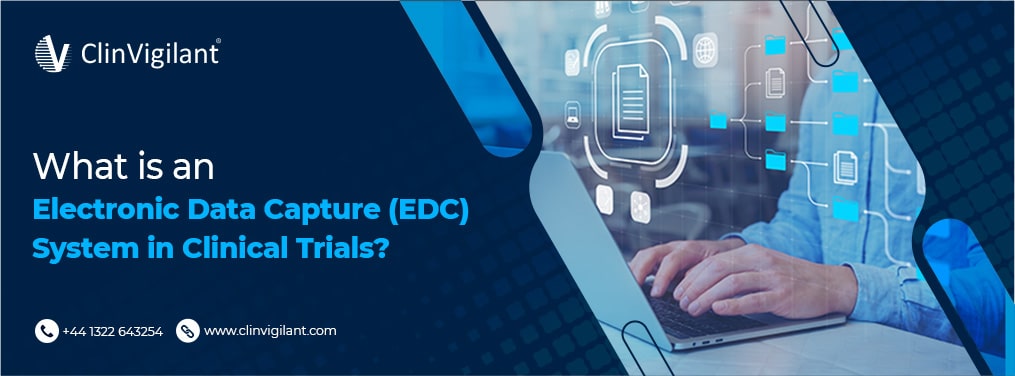
What is an Electronic Data Capture (EDC) in Clinical Trials?
Electronic data capture (EDC) systems are revolutionizing the way clinical trials are conducted. By replacing the traditional paper-based data collection with electronic methods, EDC systems are providing significant improvements in efficiency, accuracy, and overall trial performance. In this blog, we will explore what EDC systems are, their benefits, implementation challenges, and the future trends shaping this vital clinical trials technology.
Electronic Data Capture (EDC) System- What is it?
An electronic data capture (EDC) system is a software platform used to electronically collect clinical trial data in a validated, auditable, and integrated manner. EDC systems provide an alternative to the historically predominant paper-based data collection method.
With EDC Clinical Study, clinical trial data is entered directly into a secure online database via an electronic case report form (eCRF) instead of being handwritten on paper. The eCRF serves as the electronic version of the traditional paper CRF. It is used by investigative sites and sponsors to capture subject data for clinical trials.
EDC systems centralize data capture and provide sponsors, CROs, and investigative sites with real-time access to clean, validated data. This results in faster database lock, improved data accuracy, and more efficient trial management.
Different Types of EDC Systems
There are a few different types of EDC systems, categorized by the technology they use:
- Cloud-based EDC: As the name suggests, this type of EDC system stores data on the cloud. Users can access it anytime, anywhere via the internet. Cloud-based systems provide high scalability.
- Licensed EDC: This is an on-premise client-server based EDC model. Users download and install EDC software on their systems. All data is stored on the organization’s servers.
- Web-based EDC: Web-based systems do not require any additional software installation. Users only need an internet browser to access the EDC platform online. However, web-based EDCs have limited offline capabilities.
- Hybrid EDC: Hybrid EDCs combine the elements of cloud-based and licensed EDCs. They provide both online and offline functionality along with cloud storage benefits. This makes hybrid EDCs highly flexible.
Benefits of Electronic Data Capture in Clinical Trials
Implementing an EDC system provides numerous advantages over paper-based data collection:
- Real-time access to data: EDC provides sponsors and sites instant access to clinical trial data as soon as it is entered into the system. This enables real-time data cleaning and rapid query resolution.
- Improved data quality: EDC improves data accuracy by using validation checks and quality control processes during data entry. This reduces queries and clean-up times.
- Increased efficiency: By eliminating paper data collection and management, EDC systems significantly improve workflow efficiency. This leads to faster database lock and study completion.
- Enhanced compliance: EDC provides a full audit trail making it easier to comply with regulatory guidelines. Features like user access controls also improve compliance.
- Flexible reporting: Most EDC systems allow users to generate reports, graphs, and analytics in real-time. This level of reporting is not possible with paper records.
- Cost savings: Despite the initial set-up costs, EDC systems reduce long-term costs by improving efficiency. Printing, storage, and archival costs are also minimized.
- Supports eSource data: EDC allows clinical trials to collect source data electronically (eSource). This prevents duplication of data entry efforts.
Implementing an EDC System
Implementing an EDC system requires careful planning and consideration of the following steps:
- Choosing the right EDC vendor: Select an industry-validated EDC vendor that meets your clinical trial requirements and provides training, validation, and multi-trial support.
- EDC study build: The eCRF forms are designed based on the study protocol. The EDC database architecture is also set-up.
- Integrating external systems: If needed, the EDC software is integrated with the CTMS, IWRS, eCOA, and other external systems.
- Data validation programming: Validation checks are programmed to ensure high data quality. These include mathematical checks, date checks, required field checks etc.
- EDC review & testing: Stakeholders review and test the EDC system’s study build, forms, and validation checks before release.
- Training users: Sponsors, sites, CRAs, and other EDC users are comprehensively trained on using the system.
- Go live: After testing and training, the EDC system goes live. Users can start entering clinical trial data as participants are enrolled.
- Ongoing support: The EDC vendor provides ongoing maintenance support to troubleshoot issues and release new features/enhancements.
Challenges Associated with EDC System Implementation
The switch to EDC for clinical trials isn’t without its own set of challenges. These aren’t necessarily anything to be afraid of; it’s just important to familiarize yourself with them before you start using an EDC system.
Implementing an Enterprise Data Collection (EDC) system can be a complex and challenging process, with several potential roadblocks along the way.
While Electronic Data Capture Clinical Trials adoption continues to rise, some key challenges need to be addressed during implementation:
- Complex implementation timeline: EDC study build and validation requirements make the EDC rollout timeline complex, specifically for regulated trials.
- User adoption issues: Lack of training and change management hampers user adoption of EDC systems. This can impact data quality.
- Integration challenges: Integrating the EDC system with existing clinical trial systems like CTMS, RTSM, IVRS etc. can be difficult.
- High initial costs: The EDC software, vendor fees, device procurement, and validation services lead to high upfront costs.
- Technical issues: EDC systems can suffer from performance issues, bugs, poor design, and system outages – all detrimental for trials.
- Compliance considerations: EDC systems require compliance with stringent data privacy and security regulations like 21 CFR Part 11.
- Limited reporting flexibility: The reporting functionality of some EDCs may not meet sponsors’ custom requirements.
Careful vendor selection, extensive testing, training, and change management are key to successfully overcoming these challenges.
Security and Compliance with EDC Systems
When it comes to using an EDC system in clinical trials, security and compliance are key. In order for EDC systems to be compliant with all applicable regulations, they must provide the necessary security features and maintain standards like data privacy and integrity.
Security and compliance are critical considerations in the implementation and use of Enterprise Data Collection (EDC) systems in clinical trials. EDC systems often handle sensitive and confidential data, including patient information and clinical trial results, which must be protected against unauthorized access
Maintaining data security and compliance is a major priority for Electronic Data Capture Clinical Research systems handling regulated clinical trial data. Some ways EDCs ensure security and compliance include:
- User access controls and layered authorizations to prevent unauthorized access
- Advanced encryption technologies to securely transmit and store sensitive data
- Comprehensive audit trails that record all user actions for auditing
- Validation of software per GAMP 5 and 21 CFR Part 11 regulations
- Backup, recovery, and disaster recovery mechanisms to prevent data loss
- Configurable de-identification capabilities for blinded trials
- Mechanisms to handle data amendments and queries in line with governing guidelines
- Robust validations to ensure quality data collection per protocol
Selecting 21 CFR Part 11 compliant EDC vendors is crucial for maintaining the highest security and compliance standards.
Trends in EDC Clinical Trials
Some notable trends shaping the EDC clinical trials landscape:
- Increased adoption of cloud-based EDC systems owing to their flexibility, scalability, and lower startup costs
- eSource or EDC systems collecting data electronically at the investigational site to prevent duplicate data entry
- Use of EDC for observational studies and registries, not just RCTs
- Improved integration of EDC with ePRO, eCOA, IWRS, CTMS, and RTSM systems via standards like CDISC
- Incorporation of AI, machine learning, and predictive analytics within EDC software
- Bring Your Own Device (BYOD) support to allow site personnel the flexibility of entering data from their personal mobile devices
- Enhanced focus on user experience – intuitive, easy-to-use interface and workflows
Conclusion
The clinical trials industry is steadily moving away from paper-based data collection as EDC in clinical research provide a faster, more efficient, and higher quality approach. EDC adoption reduces trial costs, enhances compliance, and provides sponsors real-time access to pristine data. While shifting from paper to an EDC Data Capture Involves significant change management, the long-term benefits make this digital transition worthwhile. As technology and regulations evolve, EDC systems will continue to transform into even smarter and compliant data capture solutions.

